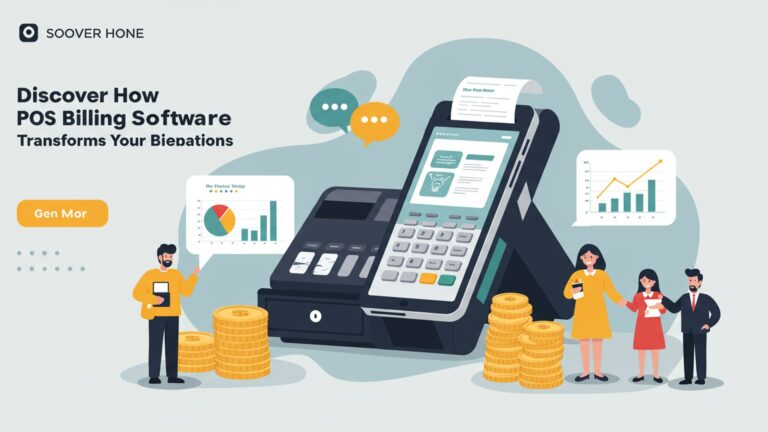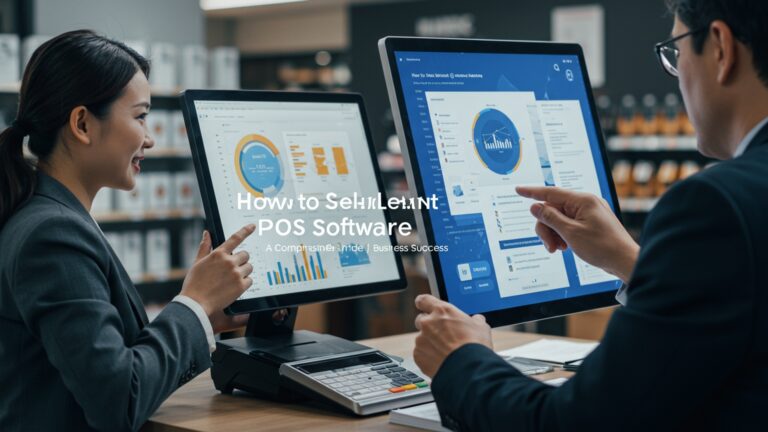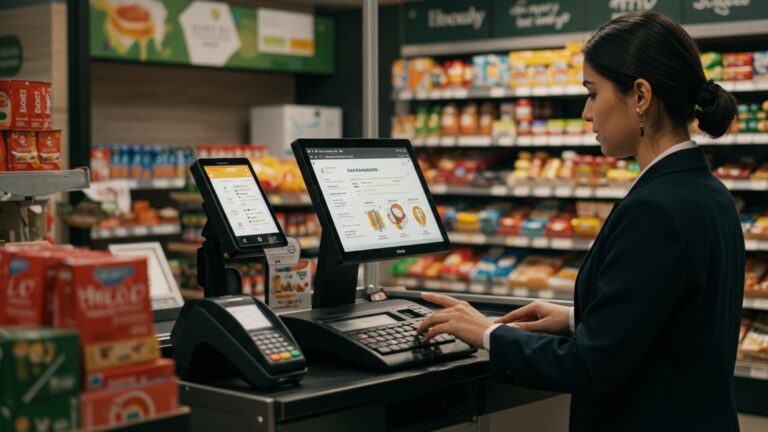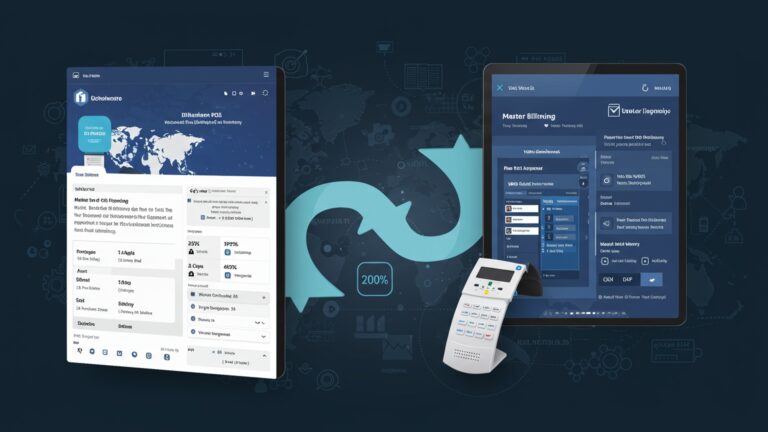Master Selecting the Best POS Software in India Your Essential Guide
India’s dynamic commercial landscape, from bustling QSRs to expansive retail chains, increasingly requires a Point-of-Sale system that transcends basic billing, acting as a strategic operational hub. The complexity of managing inventory across multiple locations, processing high volumes of UPI transactions. ensuring stringent GST compliance demands sophisticated capabilities. Businesses often grapple with fragmented legacy systems that hinder real-time data analytics and seamless omnichannel integration. Identifying the best POS software in India means evaluating solutions that offer robust cloud scalability, AI-driven sales forecasting. native integration with the nation’s rapidly evolving digital payment ecosystem. Such a system empowers enterprises to enhance customer experience, optimize stock levels. make data-driven decisions amidst intense market competition.

Understanding the Core of POS Software
In the dynamic landscape of Indian retail and hospitality, a Point of Sale (POS) system is no longer just a cash register; it’s the central nervous system of a modern business. At its core, POS software is a sophisticated application that processes transactions, manages inventory, tracks customer data. provides invaluable insights into sales performance. For businesses in India, where competition is fierce and customer expectations are constantly evolving, selecting the best POS software in India is paramount for sustained growth and operational efficiency.
Let’s break down what a POS system typically entails:
- Hardware Components
- Software Components
These are the physical devices that facilitate transactions and operations. They often include a monitor or tablet, a barcode scanner, a receipt printer, a cash drawer. a payment terminal.
This is the brain of the system, managing all data and processes. It can be cloud-based (accessible via internet from any device) or on-premise (installed directly on your local servers).
The significance of a robust POS system in the Indian context cannot be overstated. From enabling quick and accurate billing to streamlining inventory across multiple locations, it empowers businesses to make data-driven decisions, enhance customer experiences. ultimately boost profitability. Consider a bustling cafe in Mumbai or a multi-brand retail store in Delhi; without efficient transaction processing and inventory tracking, chaos would quickly ensue. The right POS software transforms these challenges into opportunities.
Identifying Your Business Needs – The First Step
Before diving into feature lists and pricing, the most crucial step is a thorough self-assessment of your business’s unique requirements. What works for a large supermarket chain will likely be overkill or insufficient for a small, artisanal boutique. Identifying your specific needs is the foundation for finding the best POS software in India for your operations.
- Industry-Specific Requirements
- Retail
- Restaurant/Cafe
- Salon/Spa
- Pharmacy
- Business Size and Scalability
- Inventory Management Complexity
- Customer Relationship Management (CRM) Needs
- Reporting and Analytics Requirements
Do you need robust inventory management for thousands of SKUs, barcode scanning, loyalty programs. seasonal sales tracking?
Are table management, kitchen order ticketing (KOT), menu customization, ingredient-level inventory. delivery integration essential?
Will appointment scheduling, staff management, service package creation. client history tracking be critical?
Do you require batch tracking, expiry date management, prescription management. regulatory compliance features?
Are you a single-outlet startup, or do you envision expanding to multiple locations? Your chosen POS should grow with you, easily adding new users, stores, or features without a complete system overhaul.
Do you deal with simple product counts, or do you require advanced features like batch tracking, vendor management, purchase order generation. stock transfers between stores?
Is customer loyalty crucial? Do you need to capture customer details, track purchase history, offer discounts, or run targeted marketing campaigns?
What kind of data do you need to make informed decisions? Sales trends, peak hours, best-selling products, employee performance, or profit margins? Ensure the software can generate these reports in an easily digestible format.
A small apparel store owner, Ms. Sharma from Jaipur, initially chose a basic POS system. As her business grew and she introduced new product lines and an online presence, she realized her basic system couldn’t handle advanced inventory, e-commerce integration, or detailed customer analytics. Her experience underscores the importance of anticipating future needs when selecting the best POS software in India.
Key Features to Look for in the Best POS Software in India
Once you’ve mapped out your needs, it’s time to evaluate the features offered by various POS solutions. The ideal software will seamlessly integrate these functionalities to create a unified operational ecosystem.
- Inventory Management
- Real-time stock tracking
- Batch and serial number management
- Purchase order management
- Supplier management
- Stock alerts (low stock notifications)
- Multi-store inventory synchronization
- Sales & Transaction Processing
- Fast and accurate billing
- Customizable product catalog
- Discount and promotion management
- Return and exchange processing
- Ability to hold/park sales
- Offline mode (crucial for areas with inconsistent internet)
- Customer Management (CRM)
- Customer database management
- Loyalty programs and reward points
- Purchase history tracking
- SMS/Email marketing integration
- Employee Management
- Sales staff performance tracking
- Shift management and time clock
- User roles and permissions (to control access)
- Reporting & Analytics
- Sales reports (daily, weekly, monthly, yearly)
- Product performance reports
- Employee performance reports
- Inventory reports
- Customer purchase insights
- Customizable dashboard
- Payment Processing Integration
- Seamless integration with popular payment gateways (e. g. , PayU, Razorpay, BillDesk)
- Support for various payment methods: cash, card (debit/credit), UPI, mobile wallets (Paytm, Google Pay, PhonePe), net banking.
- EMV compliance for secure card transactions.
- Multi-Store Capabilities
- Security
- Cloud-based vs. On-premise
- Cloud-based POS
- On-premise POS
This is often the most critical feature.
If you have or plan to have multiple outlets, the software should allow centralized management of inventory, pricing. reporting across all locations.
Data encryption, user access controls. regular backups are non-negotiable to protect sensitive business and customer data.
Accessible from anywhere, real-time data synchronization, automatic updates, lower upfront hardware costs. Requires reliable internet.
Data stored locally, greater control, no reliance on internet (except for updates/integrations). Higher upfront costs and maintenance.
Technical Considerations and Integrations
A standalone POS system, no matter how feature-rich, often falls short in today’s interconnected business environment. The ability to integrate with other essential business tools is a hallmark of the best POS software in India.
- Hardware Compatibility
- Third-Party Integrations
- E-commerce Platforms
- Accounting Software
- Payment Gateways
- CRM & Marketing Tools
- Delivery Platforms
- API Availability
Ensure the software is compatible with your existing or planned hardware (scanners, printers, payment terminals). Some POS systems are hardware-agnostic, while others are optimized for specific brands.
Seamless syncing with platforms like Shopify, WooCommerce, Magento, if you have an online store. This avoids manual data entry and ensures consistent inventory.
Integration with Tally. ERP 9, Zoho Books, QuickBooks, or other accounting solutions is crucial for financial reconciliation and tax compliance (especially GST). This automates data transfer, reducing errors and saving time.
Direct integration with local and international payment providers ensures smooth transaction processing.
For advanced customer engagement.
Essential for restaurants integrating with Swiggy, Zomato, etc.
For businesses with unique needs, an open API (Application Programming Interface) allows custom integrations and development, offering unparalleled flexibility. This is a sign of a truly adaptable solution.
// Example of a hypothetical API call for fetching product data GET /api/v1/products/{product_id} // Example of a hypothetical API call for creating a new sale POST /api/v1/sales Content-Type: application/json { "customer_id": "CUST123", "items": [ {"product_id": "PROD001", "quantity": 2}, {"product_id": "PROD002", "quantity": 1} ], "payment_method": "UPI" }
If you’re switching from an older system or manual records, inquire about the ease and support for migrating your existing product, customer. sales data. A smooth migration process prevents operational disruption.
Understanding Pricing Models and ROI
Cost is always a significant factor. it’s crucial to look beyond the sticker price. The best POS software in India offers transparent pricing and a clear path to return on investment (ROI).
- Subscription Models vs. One-time Purchase
- Subscription (SaaS)
- One-time Purchase (Perpetual License)
- Hidden Costs
- Setup and installation fees
- Training costs
- Hardware costs (if not included)
- Payment processing fees (per transaction)
- Additional module fees (e. g. , advanced inventory, CRM)
- Annual maintenance contracts (for on-premise)
- Data backup and recovery services
- Calculating ROI
- Reduced manual errors
- Optimized inventory
- Improved customer loyalty
- Data-driven decisions
- Time savings
Most common for cloud-based POS. You pay a recurring fee (monthly/annually) per terminal or per user. This includes updates and support. Lower upfront cost. ongoing expense.
More common for on-premise solutions. Higher upfront cost. you own the software. May incur separate costs for updates, maintenance. support.
Always ask about potential additional expenses:
The value of a POS system isn’t just about cost savings; it’s about revenue generation and efficiency gains.
Faster checkout, accurate pricing.
Less waste, fewer stockouts, better cash flow.
Targeted marketing, personalized offers.
Identify best-selling products, peak hours, staffing needs.
Automated reporting, simplified accounting integration.
A restaurant owner in Bangalore, after implementing a modern POS system, reported a 15% reduction in food waste due to better inventory tracking and a 10% increase in average bill value thanks to integrated upsell prompts and loyalty programs. These tangible benefits highlight the true ROI of investing in the right POS solution.
Support, Training. User Experience
Even the most advanced software is only as good as its usability and the support behind it. This is particularly true for businesses in India, where quick resolutions and local language support can be critical.
- Customer Support Availability and Quality
- Is support available 24/7, or during specific business hours?
- What channels are offered: phone, email, chat, in-person?
- Is local language support (Hindi, Marathi, Tamil, etc.) available? This is a significant differentiator in India.
- Check reviews regarding response times and problem resolution effectiveness. A quick Google search for “[POS software name] India reviews” can be very telling.
- Training Resources
- Does the vendor provide initial training for your staff? Is it in-person, online, or via documentation?
- Are there ongoing training modules or resources for new hires or feature updates?
- User manuals, video tutorials. an active knowledge base are invaluable.
- Ease of Use (UI/UX)
- A complex system, regardless of its features, will lead to errors and staff frustration.
- Look for an intuitive, clean interface that requires minimal training.
- The workflow should mirror your business processes logically.
- Trial periods are excellent for assessing user-friendliness firsthand.
When Mr. Patel opened his electronics store in Ahmedabad, he prioritized a POS system with excellent local support. “When our system went down during Diwali rush, having a support team that understood the urgency and spoke Gujarati made all the difference,” he recalls. This anecdote emphasizes that for the best POS software in India, local and accessible support is often as vital as the features themselves.
Comparing Top Contenders: A Feature Overview
While specific brand names are beyond the scope here, we can categorize and compare types of POS solutions commonly available in India based on their strengths and target markets. This table will help you identify which category might align best with your needs when searching for the best POS software in India.
| Feature/Category | Basic Retail POS (e. g. , for Small Shops) | Advanced Cloud-based Retail/Restaurant POS | Enterprise-Level On-Premise POS |
|---|---|---|---|
| Target Business Size | Micro to Small businesses, single outlet | Small to Medium, multi-outlet, growing businesses | Large enterprises, chains, complex operations |
| Key Strengths | Affordable, easy to set up, basic sales/inventory | Scalable, real-time data, rich features, robust integrations, remote access | High customization, data control, complex security, offline reliability |
| Inventory Management | Basic stock count, product entry | Advanced multi-location, batch tracking, POs, vendor management | Highly customizable, complex warehouse management, inter-store transfers, demand forecasting |
| CRM & Loyalty | Basic customer database, simple discounts | Integrated loyalty programs, purchase history, targeted offers | Comprehensive CRM, advanced analytics, personalized marketing automation |
| Reporting & Analytics | Basic sales reports | Detailed sales, inventory, employee, customer reports; customizable dashboards | Deep analytics, custom report builder, business intelligence tools |
| Integrations | Limited (e. g. , basic accounting) | Extensive (e-commerce, accounting, payment gateways, delivery apps) | Open API for highly specialized integrations, ERP integration |
| Pricing Model | Low-cost perpetual license or basic monthly subscription | Tiered monthly/annual subscription (per terminal/user) | High upfront license fee, recurring maintenance/support contracts |
| Offline Mode | Often available for transactions, limited data sync | Robust offline capabilities, seamless data sync when online | Strong offline reliability, local data processing |
| Support | Standard (email/phone during business hours) | Responsive, multi-channel, often local support | Dedicated account manager, 24/7 premium support |
Real-World Scenarios and Case Studies
Understanding how different businesses leverage POS software can provide practical insights. These real-world applications highlight the versatility of the best POS software in India.
- Case Study 1: “The Organic Pantry” (Small Retail Boutique)
A small organic grocery store in Pune needed a system to manage a rapidly changing inventory of fresh produce, packaged goods. artisanal products. They chose a cloud-based POS that offered:
- Real-time inventory
- Integrated weighing scale
- Customer loyalty program
- Basic accounting integration
Essential for perishable goods, reducing waste and ensuring stock availability.
For selling items by weight.
To reward repeat customers buying organic produce.
To streamline GST filing.
This enabled them to keep track of inventory accurately, reduce losses from spoilage. build a loyal customer base without heavy upfront investment.
- Case Study 2: “Spice Route” (Busy Restaurant Chain)
A popular chain of North Indian restaurants with five outlets across Delhi required a robust system to handle high transaction volumes, complex menus. staff management. They opted for an advanced cloud-based restaurant POS known for its comprehensive features:
- Table management and KOT system
- Ingredient-level inventory
- Centralized menu management
- Integration with Zomato and Swiggy
- Employee shift and performance tracking
Streamlined order flow from waitstaff to kitchen.
To manage raw materials and control food costs.
Allowing updates across all five outlets from a single dashboard.
To manage online orders seamlessly.
To optimize staffing and incentivize good service.
The system significantly improved order accuracy, reduced serving times. provided valuable data on popular dishes and peak hours, leading to better operational planning and increased customer satisfaction.
- Case Study 3: “TechZone Electronics” (Multi-Location Electronics Store)
A growing electronics retailer with ten stores nationwide needed a POS system that could handle high-value items, serial number tracking, warranty management. extensive financing options. They chose an enterprise-grade POS solution with strong customization capabilities:
- Serial number and IMEI tracking
- Multi-store inventory synchronization
- Integration with financing partners
- Detailed sales analytics
- Comprehensive CRM
Critical for high-value electronics and warranty claims.
Allowing customers to check stock at other branches and facilitating inter-store transfers.
For EMI options and credit sales.
To track performance of different brands and product categories across regions.
To manage customer purchase history and offer extended warranty services.
This system provided them with unparalleled control over their vast inventory, enhanced customer service through informed sales. improved financial reporting and compliance.
Navigating the Indian Market: Specific Challenges and Opportunities
The Indian market presents unique characteristics that influence the selection of the best POS software in India. Understanding these nuances is key to making an informed decision.
- GST Compliance
- Local Payment Methods
- Language Support
- Internet Connectivity Issues
- Affordability and Value
India’s Goods and Services Tax (GST) regime is complex. Your POS software must be fully compliant, accurately calculating GST on various products and services, generating GST-ready invoices. providing reports that simplify quarterly or monthly filings. This is non-negotiable for any business operating in India.
Beyond cards and cash, the proliferation of digital payment methods like UPI (Unified Payments Interface), mobile wallets (Paytm, Google Pay, PhonePe). net banking is huge in India. The chosen POS must seamlessly integrate with these diverse payment options to cater to a broad customer base and ensure quick, secure transactions.
While English is widely used, regional languages play a crucial role, especially in smaller towns and for staff interaction. Some advanced POS systems offer multi-language support for the user interface, receipts. customer communication, which can significantly enhance user adoption and customer experience.
Despite advancements, reliable high-speed internet can still be a challenge in certain parts of India. This makes a robust “offline mode” a critical feature. The POS should be able to process transactions and capture data even without an internet connection, syncing automatically once connectivity is restored, to prevent business disruption.
Indian businesses, particularly SMEs, are often price-sensitive. While looking for the best POS software in India, it’s essential to balance features with cost-effectiveness. Many Indian-specific POS providers offer competitive pricing models tailored to local market conditions, often including essential integrations at reasonable rates.
Conclusion
Selecting the ideal POS software in India, as you’ve discovered, transcends mere feature comparison; it’s about finding a strategic partner for your business’s growth. Remember, a robust system like one offering seamless UPI integration, crucial in today’s digital India, isn’t just about processing transactions but about enhancing customer experience and operational efficiency. My personal tip? Beyond the demo, talk to current users in your specific niche – a saree shop owner’s needs differ vastly from a pharmacy’s. Consider how the software scales with your ambition, rather than just meeting today’s demands. The right choice empowers you to navigate market shifts, from managing dynamic inventory for seasonal sales to generating insightful reports that drive profitability. This isn’t just an expense; it’s an investment in streamlining your operations and unlocking new revenue streams. Approach this decision with confidence, knowing you’re building a foundation for sustainable success in India’s competitive retail landscape. For further insights on implementation, explore How to Select and Implement POS Software.
More Articles
How to Maximize Retail Sales With Powerful POS Software
Maximize Profit Learn 7 Smart Inventory Management Strategies for Indian POS
How to Choose the Best POS Software to Streamline Your Sales
7 Essential POS System Features Every Saree Shop Needs
How to Choose the Best Cloud POS for Your Indian Restaurant 5 Tips
FAQs
What exactly is POS software. why do Indian businesses really need it?
POS software, or Point of Sale software, is what businesses use to complete sales transactions. For Indian businesses, it’s crucial for more than just billing. It helps manage inventory, track sales performance, handle customer data, process payments efficiently (including UPI, cards. cash). even generate reports for better decision-making. It streamlines operations, reduces errors. significantly improves the customer experience.
What essential features should I prioritize when looking for POS software in India?
When shopping for POS software in India, definitely look for robust inventory management, multi-payment options (cash, card, UPI, wallets), GST compliance and reporting, customer relationship management (CRM) capabilities, sales analytics. employee management. Cloud-based options are often preferred for their flexibility and accessibility. Also, consider features like multi-store management if you plan to expand.
How much does good POS software usually cost in India?
The cost of POS software in India can vary quite a bit, depending on the features, vendor. whether it’s cloud-based or on-premise. You might find subscription models starting from a few hundred rupees per month for basic plans, going up to several thousands for more advanced, feature-rich systems. On-premise solutions usually involve an upfront license fee plus maintenance. Always factor in hardware costs if not included.
Cloud-based or on-premise POS: Which one is a better fit for my Indian business?
For most Indian businesses today, cloud-based POS is generally the better choice. It offers more flexibility, lower upfront costs (subscription model), automatic updates. you can access your data from anywhere with an internet connection. On-premise systems give you more control over data and don’t rely on internet connectivity as heavily. they require more IT maintenance and higher initial investment. Consider your internet reliability and budget.
What are some common challenges businesses in India face when implementing new POS software?
Common challenges include data migration from old systems, staff training and resistance to new technology, ensuring smooth integration with existing accounting or ERP software, dealing with initial technical glitches. sometimes, unreliable internet connectivity in certain areas affecting cloud-based systems. Choosing a vendor with good local support and thorough training can mitigate many of these issues.
How can I make sure the POS software I choose integrates well with my other business tools?
Integration is super crucial! When evaluating POS software, always ask about its compatibility with other systems you use, like accounting software (e. g. , Tally, Zoho Books), e-commerce platforms, or loyalty programs. Look for vendors who offer APIs or pre-built integrations. A good POS system should seamlessly share data to avoid manual data entry and ensure consistent details across your operations.
What kind of after-sales support should I expect from a POS vendor in India?
Good after-sales support is crucial. You should expect prompt customer service, ideally available through multiple channels (phone, email, chat), for troubleshooting and queries. Look for vendors offering local support, on-site assistance if needed. regular software updates. A reliable vendor will provide training resources and ongoing technical assistance to ensure your operations run smoothly.






